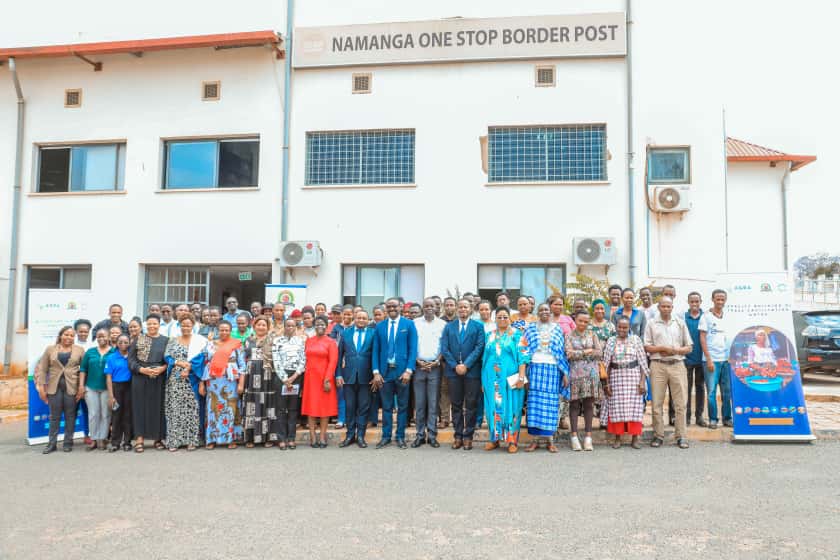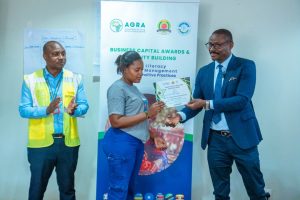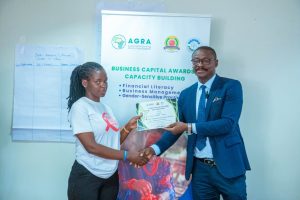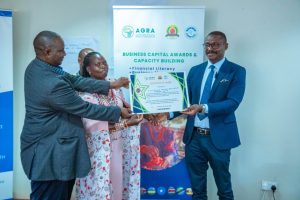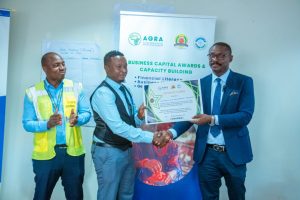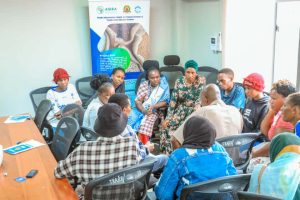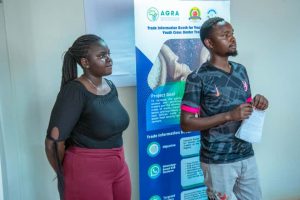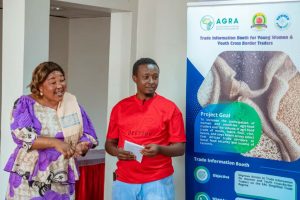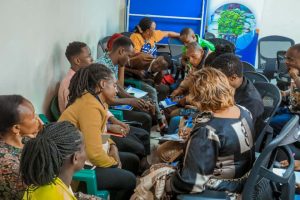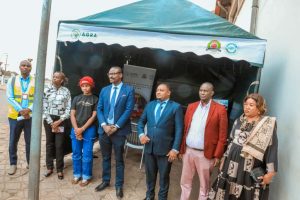- EABC–AGRA Public-Private Dialogue Calls for Adoption of Simplified Phytosanitary Certification and Import/Export Permits for Commonly Traded Goods under the EAC Simplified Trade Regime
Namanga OSBP – Sunday, 26th October 2025 – The East African Business Council (EABC), in collaboration with the Tanzania Chamber of Commerce, Industry and Agriculture (TCCIA) and in partnership with AGRA, launched a Trade Information Booth at the Namanga One Stop Border Post (OSBP) to ease access to market information, trade procedures, and guidance on the EAC Simplified Trade Regime (STR).
 Speaking during the Public-Private Dialogue on Non-Tariff Barriers (NTBs), which brought together 70 stakeholders composed of cross-border traders, leaders of Clearing and Forwarding Associations, and trade facilitation agencies that preceded the launch ceremony, Mr. Adrian Raphael Njau, Acting Executive Director of EABC, stated: “Women and youth cross-border traders face challenges navigating complex trade procedures.” He urged other border agencies to also simplify certification and lower fee requirements, to be similar to the EAC Simplified Certificate of Origin issued by Customs for goods traded under the EAC Simplified Trade Regime.
Speaking during the Public-Private Dialogue on Non-Tariff Barriers (NTBs), which brought together 70 stakeholders composed of cross-border traders, leaders of Clearing and Forwarding Associations, and trade facilitation agencies that preceded the launch ceremony, Mr. Adrian Raphael Njau, Acting Executive Director of EABC, stated: “Women and youth cross-border traders face challenges navigating complex trade procedures.” He urged other border agencies to also simplify certification and lower fee requirements, to be similar to the EAC Simplified Certificate of Origin issued by Customs for goods traded under the EAC Simplified Trade Regime.
Mr. Njau further stated that the EABC case study on cereals and horticulture trade under the EAC Simplified Trade Regime revealed that high costs of plant health inspection and certification—approximately USD 100—reduce profit margins for traders with low capital and low value consignments, leading some to use ungazetted border crossing.
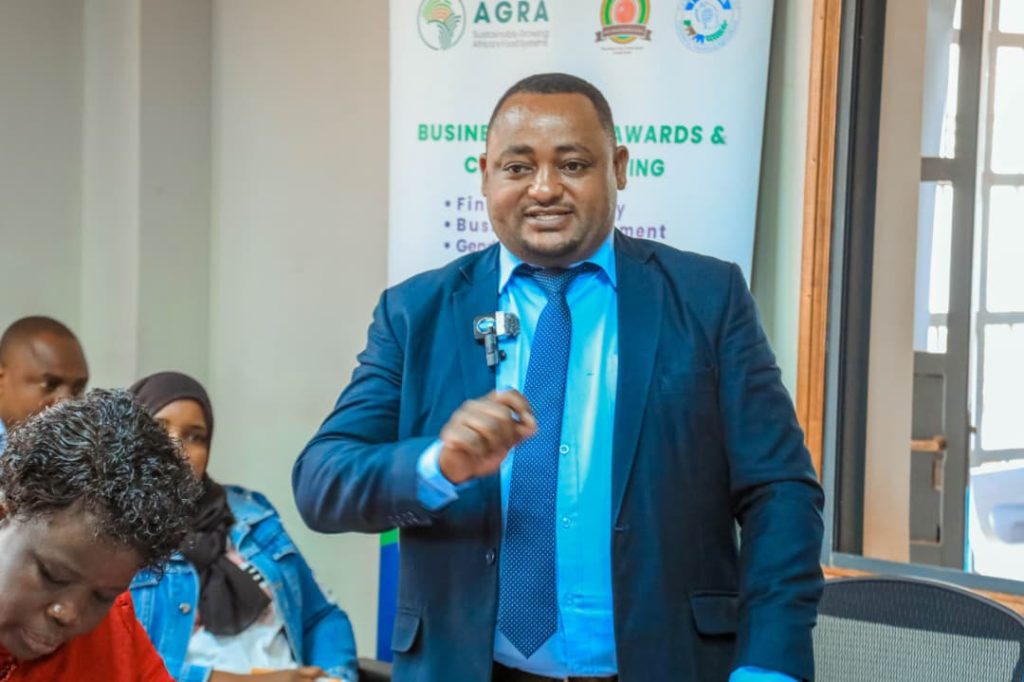 Representing the Permanent Secretary, Ministry of Foreign Affairs and East African Cooperation of the United Republic of Tanzania, Mr. Amedeus Arbogast Mzee commended EABC and AGRA for the capacity-building initiatives for women and youth cross-border traders and advocacy for the elimination of NTBs. He emphasized that this aligns with the Treaty for the Establishment of the EAC, Article 121, which emphasizes on social welfare, promotion of youth and women empowerment, gender equality, and improving livelihoods. He urged for formation of cross border cooperatives to support women and youth in trade of cereal and horticulture value chains.
Representing the Permanent Secretary, Ministry of Foreign Affairs and East African Cooperation of the United Republic of Tanzania, Mr. Amedeus Arbogast Mzee commended EABC and AGRA for the capacity-building initiatives for women and youth cross-border traders and advocacy for the elimination of NTBs. He emphasized that this aligns with the Treaty for the Establishment of the EAC, Article 121, which emphasizes on social welfare, promotion of youth and women empowerment, gender equality, and improving livelihoods. He urged for formation of cross border cooperatives to support women and youth in trade of cereal and horticulture value chains.
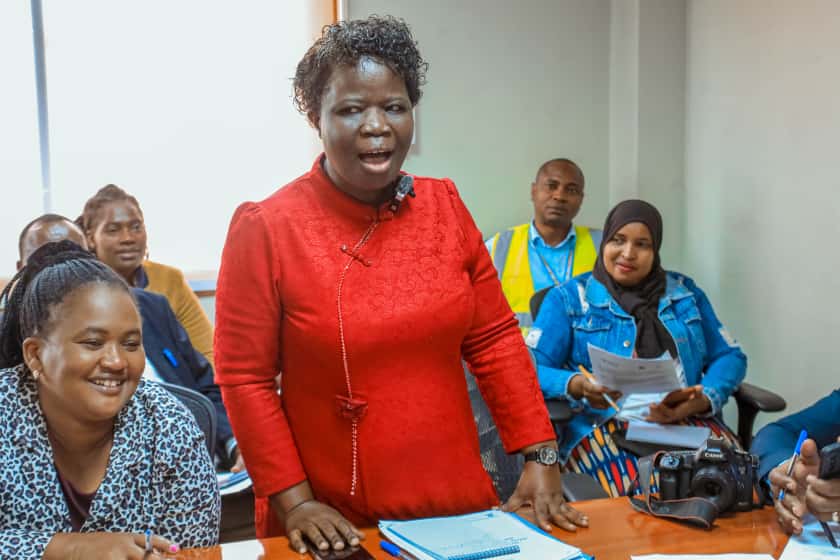 On her part, the representative of the Principal Secretary, Ministry of EAC, ASALs and Regional Development, State Department for EAC Affairs of the Republic of Kenya, Ms. Mary Maisory reiterated the Ministry’s commitment to resolving non-tariff barriers that will be outlined in the roadmap developed during the Public-Private Dialogue. She urged women and youth traders to utilize the EAC Simplified Trade Regime to enhance their contribution to intra-EAC trade.
On her part, the representative of the Principal Secretary, Ministry of EAC, ASALs and Regional Development, State Department for EAC Affairs of the Republic of Kenya, Ms. Mary Maisory reiterated the Ministry’s commitment to resolving non-tariff barriers that will be outlined in the roadmap developed during the Public-Private Dialogue. She urged women and youth traders to utilize the EAC Simplified Trade Regime to enhance their contribution to intra-EAC trade.
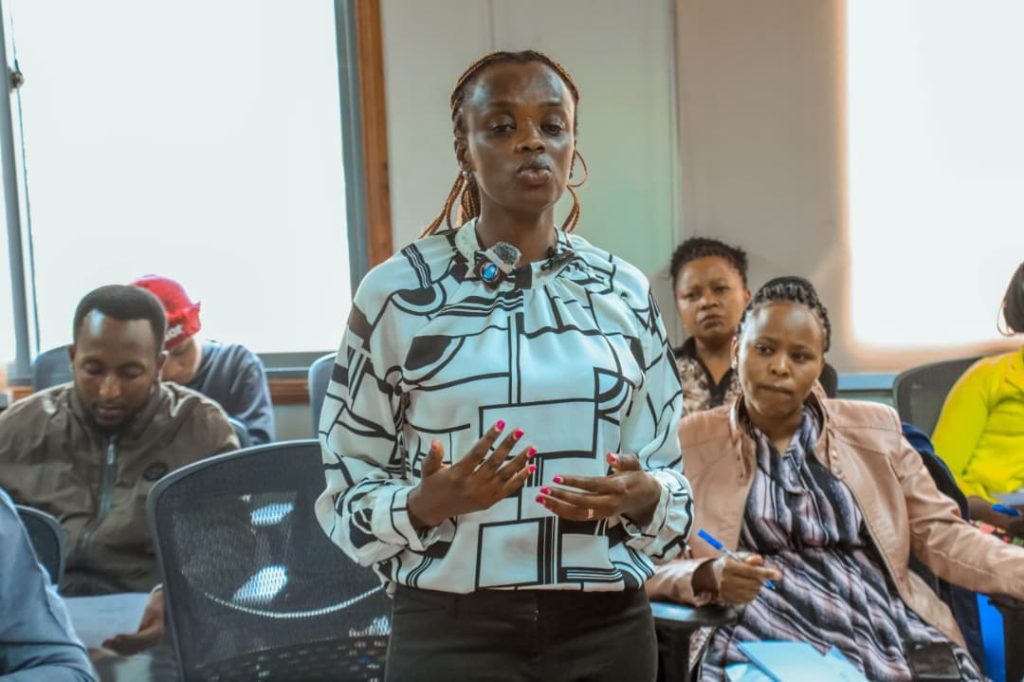 In her remarks, Ms. Barbara Mbabazi, Specialist- Youth in Markets and Trade, AGRA noted that women constitute over 70 percent of cross-border traders. She highlighted that the EABC–TCCIA–AGRA project aims to empower young women by improving their knowledge of trade procedures and boost their capacity to trade cereals and horticultural products across EAC borders.
In her remarks, Ms. Barbara Mbabazi, Specialist- Youth in Markets and Trade, AGRA noted that women constitute over 70 percent of cross-border traders. She highlighted that the EABC–TCCIA–AGRA project aims to empower young women by improving their knowledge of trade procedures and boost their capacity to trade cereals and horticultural products across EAC borders.
From the Tanzania Revenue Authority (TRA) at Namanga Border, Mr. Godwill Mollel stated that trade facilitation agencies and the information desk office are open to supporting small cross-border traders to acquire information early before embarking on trading, particularly on the steps and procedures under the EAC Simplified Trade Regime.
Representing the Kenya Revenue Authority (KRA) at Namanga Border, Mr. David Langat explained that the Simplified Trade Regime has eased the issuance of the Simplified Certificate of Origin for most commonly traded goods valued below USD 2,000.
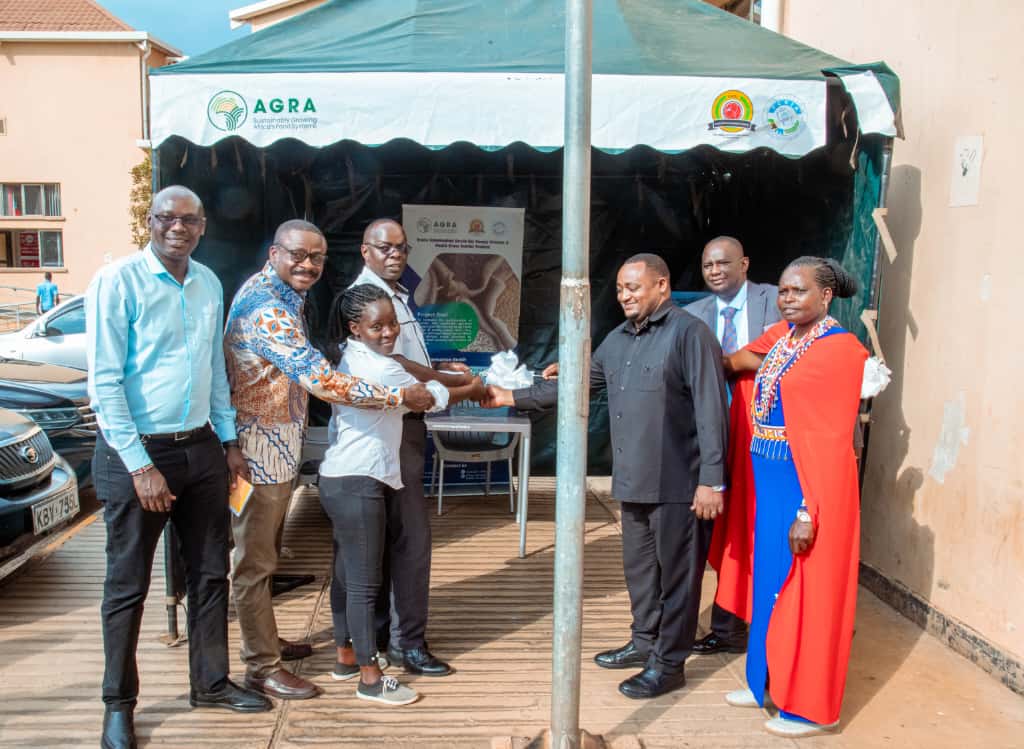 Ms. Lydia Pesa, a cereal young cross-border trader from Kenya, said: “The booth is a game-changer for us. It will significantly ease access to information on trade procedures prior to crossing the border, helping us trade smarter, faster, and with full compliance.”
Ms. Lydia Pesa, a cereal young cross-border trader from Kenya, said: “The booth is a game-changer for us. It will significantly ease access to information on trade procedures prior to crossing the border, helping us trade smarter, faster, and with full compliance.”
Ms. Monica Osward, a cross-border trader from Tanzania, stated “The mobile application in the booth will enable us to report on critical challenges, including Non-Tariff Barriers and whistleblow harassments we face.”
Ms. Monica Osward from Tanzania said” the mobile application in the booth will enable us to report on challnges such as NTB and and whistle blow on harassment”
The newly launched Trade Information Booth will serve as a one-stop center for women and youth traders. It is equipped with a television and tables displaying simplified learning videos with step-by-step procedures for trading cereals and horticultural products. The booth also provides access to online reporting of Non-Tariff Barriers (NTBs), whistle-blowing and complaint mechanisms, and a market information platform — including a WhatsApp B2B platform accessible via +255 764 520 168.
During the Public-Private Dialogue, cross-border traders highlighted several challenges undermining the effective implementation of the EAC Simplified Trade Regime. They reported difficulties in accessing import and export permits for products such as milk, cereals, livestock, and chickpeas, with temporary passes for Tanzania valid for only one entry and granary permits required for small-scale traders. High costs for permits, plant health inspections, and certification often push traders to use ungazetted routes, leading to confiscation of consignments. Traders also faced numerous roadblocks and security checks—around eight at Rubizi Police, 9 Mile, Ngatata, Kumpa, Kenda Factory, and Kitengela—even though Bisil is the only gazetted roadblock. Additional barriers include lack of mutual recognition of product standards and discriminatory taxes, such as multiple county and municipal fees with minimal services provided and excise duties on fruit imports from Kenya, all of which increase costs and hinder smooth cross-border trade.
As part of the initiative, EABC also conducted capacity-building sessions focusing on:
- Promoting gender-sensitive practices by equipping border officials and cross border traders with knowledge on inclusive trade facilitation and supporting women traders against harassment, discrimination, and gender-based violence.
- Enhancing financial literacy to enable traders to effectively manage finances and access credit.
- Strengthening business management skills within cross-border traders’ cooperatives and associations to improve governance, accountability, and market access.
- Conducted “Business Capital Award” competition, where 10 young women cross-border traders of cereals and horticultural products at Namanga OSBP will were awarded USD 200. Namely:Yasinta Robert, Jenny John Angel Nicholas, Namyak Elias, Monica Osward, Lydia Awino, Johari Kagika, Janet Munei, Ann Naimado and Angelinah Sianto.
- Recognition Awards of USD 250 to Namanga Cross Border Traders Association Kenya, USD USD 250 Namanga Women Cross Border Traders Association Kenya and USD 500 to Namanga Cross Border Traders Association Tanzania to support young cross border traders in savings and accessing micro loans.

